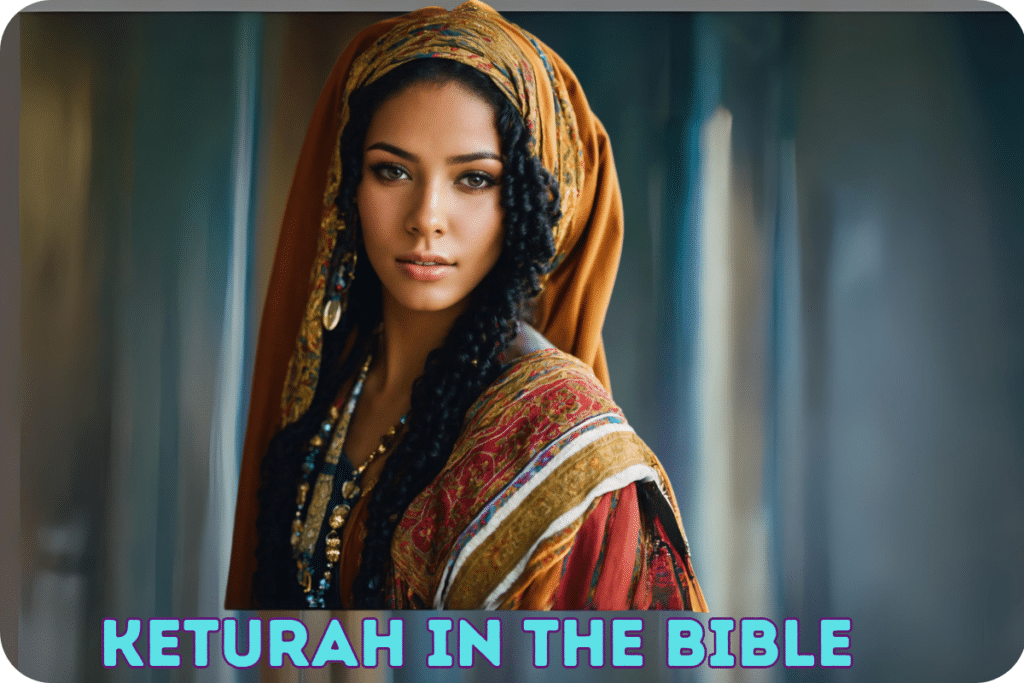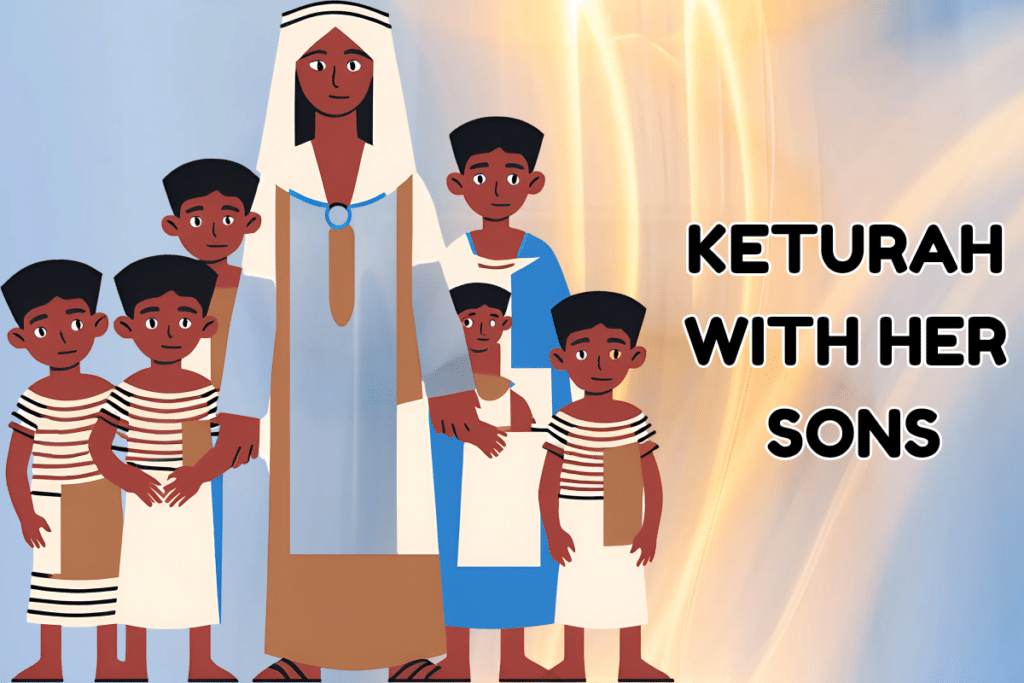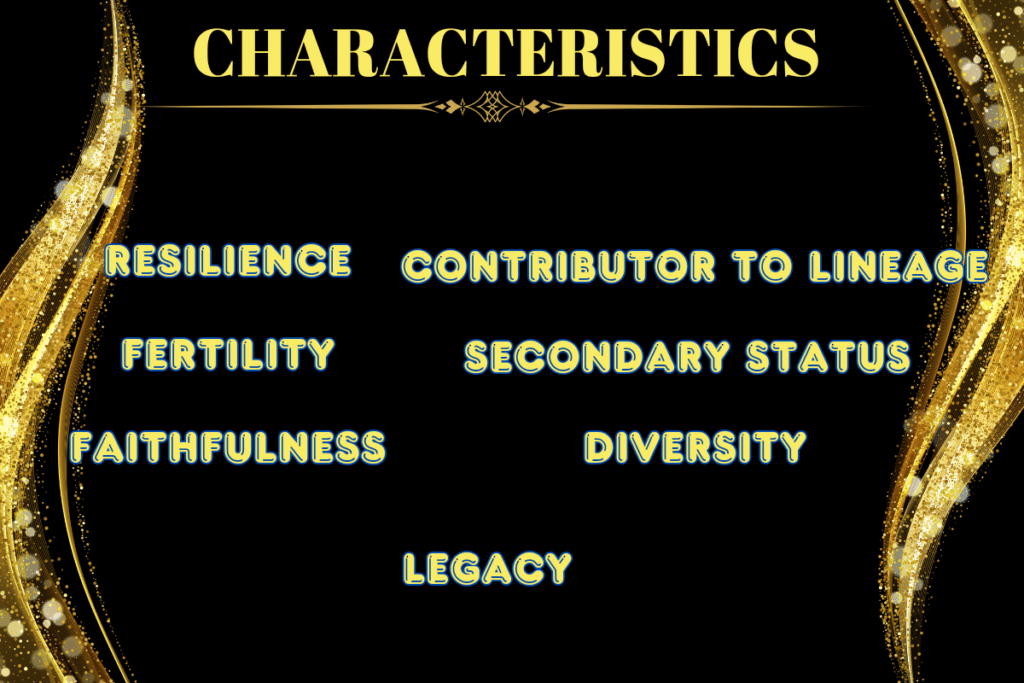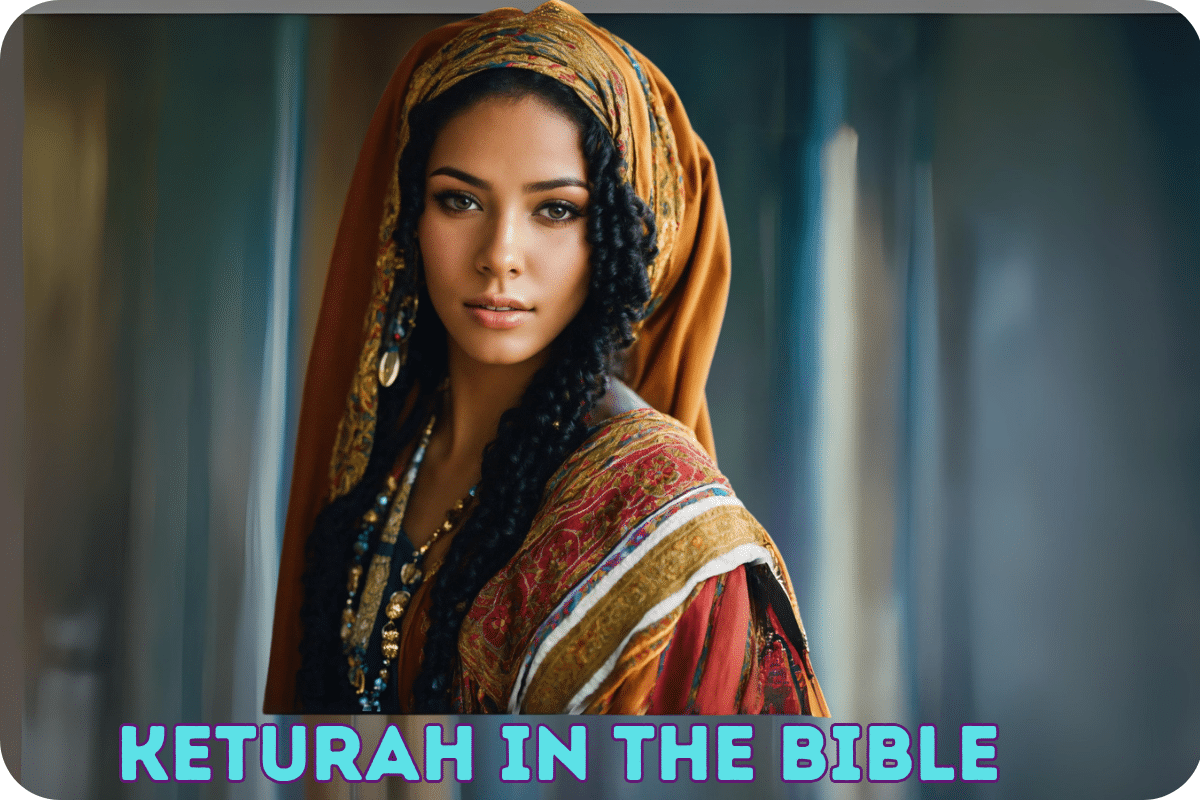KINDHEARTED KNOWLEDGEABLE KETURAH IN THE BIBLE
The name “Keturah” is of Hebrew origin and is derived from the Hebrew word “keturah,” which means “incense” or “fragrance.” In the Bible, Keturah is the name of Abraham’s wife after the death of Sarah. The meaning of her name may symbolize qualities such as sweetness, pleasantness, or the idea of offering a pleasing aroma, though interpretations may vary.

Keturah, a biblical figure mentioned in Genesis, was one of Abraham’s wives. While the Torah presents her separately, some interpretations suggest she is Hagar returning to marry Abraham after Sarah’s death. Described as virtuous, Keturah in the Bible bore Abraham six sons, fulfilling part of God’s promise to him.
Her children are seen as both a blessing to Abraham and a potential threat to Israel, akin to their brother Ishmael. Keturah’s role highlights complexities in Abraham’s family dynamics and the diverse interpretations surrounding her identity and significance in biblical narratives.
Biblical References to Keturah in the Bible
Keturah in the Bible, a wife of Abraham, is mentioned in Genesis 25:1-4 as bearing him six sons: Zimran, Jokshan, Medan, Midian, Ishbak, and Shuah. Her origin is debated among scholars, with some believing she was a Canaanite woman, possibly from the Arabian peninsula or Ethiopia, due to the meaning of her name, “incense,” in Hebrew.
Others propose she may have been a black-skinned woman of African descent. Despite these speculations, the Bible does not provide clear information about her origin. Keturah’s role is significant in fulfilling God’s promise to Abraham, as her children became the ancestors of the Arabs living in the eastern part of the land of Israel.
Background and Family of Keturah in the Bible
The Bible provides limited information about Keturah’s background prior to her marriage to Abraham. Her name, which means “incense” in Hebrew, has led some scholars to speculate that she may have originated from a spice-producing region like Arabia or Ethiopia. However, the biblical text does not clearly state her place of origin. Some interpretations suggest she could have been a Canaanite woman, given that Abraham lived among the Canaanites.
Others propose she may have been Hagar, Abraham’s former concubine, who returned to him after Sarah’s death. Ultimately, the Bible remains silent on Keturah’s lineage and family history, focusing more on her role as Abraham’s wife and the mother of his six sons.
Keturah’s Relationship with Abraham

After Sarah’s death, Abraham married Keturah in the Bible, who bore him six sons: Zimran, Jokshan, Medan, Midian, Ishbak, and Shuah. These sons went on to become the ancestors of various tribal groups, including the Midianites, who were later mentioned throughout the Old Testament. The Bible does not provide detailed information about Keturah’s background or lineage, but her role in fulfilling God’s promise to Abraham is significant.
Theories and Interpretations
Scholars and theologians offer diverse perspectives on Keturah’s role in the Bible. While some consider her a concubine due to differing biblical descriptions, others suggest she was a legal wife to Abraham. The debate stems from varying biblical references, with Genesis 25:1 labeling her as a wife and 1 Chronicles 1:32 referring to her as a concubine.
Despite this ambiguity, Keturah’s significance lies in bearing Abraham six sons, who became ancestors of Arabian tribes. Her presence in the narrative sparks discussions on her status and contribution to fulfilling God’s promise to Abraham.
The Legacy and Significance of Keturah in the Bible
The legacy of Keturah in the Bible is deeply rooted in her role as the mother of Abraham’s descendants, who go on to establish tribal lineages. Her inclusion in the genealogy of Abraham reflects the importance of family and lineage within biblical tradition. Through her six sons, Keturah in the Bible becomes a crucial figure in fulfilling God’s promise to Abraham, making him the “father of many nations”.
Her children, representing Arab tribes South and East of Palestine, contribute to the diversification of Abraham’s offspring, solidifying his status as a patriarch. Keturah’s presence in the biblical narrative underscores the significance of family ties and the continuation of Abraham’s lineage.
Lessons from The story of Keturah in the Bible
The story of Keturah in the Bible offers several valuable lessons for readers:
- Resilience in Adversity: Keturah in the Bible demonstrates resilience in her ability to adapt to life’s changes and challenges. Despite facing the loss of her husband’s primary wife, Sarah, and the complexities of being a secondary wife, she embraces her role and continues to fulfill her responsibilities.
- Faithfulness and Commitment: Keturah’s inclusion as one of Abraham’s wives suggests a level of faithfulness and commitment to her husband and family. Despite occupying a secondary position, she remains loyal and dedicated to her marital relationship.
- Contribution to Lineage: Keturah’s significant contribution lies in her role as the mother of Abraham’s descendants. Her six sons become ancestors of various tribal groups, highlighting the importance of every individual in the continuation of God’s covenant with Abraham.
- Acceptance of Diversity: Keturah’s presence adds diversity to Abraham’s lineage, reflecting the richness and complexity of God’s chosen people. Her story teaches us to embrace diversity and recognize the value of different paths and backgrounds within the broader narrative of God’s plan.
- Contribution to Lineage: Keturah’s significant contribution lies in her role as the mother of Abraham’s descendants. Her six sons become ancestors of various tribal groups, highlighting the importance of every individual in the continuation of God’s covenant with Abraham.
- Acceptance of Diversity: Keturah’s presence adds diversity to Abraham’s lineage, reflecting the richness and complexity of God’s chosen people. Her story teaches us to embrace diversity and recognize the value of different paths and backgrounds within the broader narrative of God’s plan.
Overall, The story of Keturah in the Bible offers lessons about resilience, faithfulness, diversity, adaptability, and the legacy of faith. Her example inspires readers to navigate life’s challenges with strength, faith, and a willingness to embrace new opportunities for growth and fulfillment.
Modern-Day Relevance
Keturah’s story continues to resonate in contemporary discussions about family, marriage, and identity. As a secondary wife to Abraham, her experience raises questions about gender roles and power dynamics within relationships. While some scholars view her as a concubine, others argue she held a status comparable to Sarah as a legal wife.
Keturah’s significance lies in bearing Abraham six sons, who became ancestors of Arabian tribes. Her inclusion in the biblical narrative underscores the importance of family ties and the continuation of Abraham’s lineage. Keturah’s story prompts discussions on the complexities of marriage and the diverse interpretations surrounding her identity and role.
Theological Reflections
Keturah’s inclusion in Abraham’s lineage raises significant theological questions about the nature of divine promises and the fulfillment of God’s covenant with Abraham’s descendants. Her story prompts reflection on themes of faith, providence, and the complexity of human relationships.
As a secondary wife to Abraham, Keturah’s role in bearing six sons who became ancestors of Arabian tribes underscores the diversity of Abraham’s offspring and the fulfillment of God’s promise to make him the “father of many nations”. The ambiguity surrounding Keturah’s status as a wife or concubine also invites consideration of the power dynamics and gender roles within biblical relationships.
Cultural Perspectives on Keturah in the Bible
Different cultures and religious traditions interpret Keturah’s story diversely, reflecting unique perspectives on marriage, family, and ancestry. Some view her as a virtuous woman worthy of being joined to Abraham, while others identify her with Hagar, suggesting she returned to marry Abraham after Sarah’s death.
Keturah’s children are seen as both a blessing to Abraham and a potential threat to Israel, akin to their brother Ishmael, highlighting the complexities of family dynamics and lineage in various cultural interpretations. These diverse views on Keturah’s narrative underscore the rich tapestry of cultural perspectives on relationships and heritage.
Controversies and Debates
Keturah’s role in Abraham’s life has sparked debates and controversies among scholars and theologians, particularly regarding her status as a wife or concubine and the implications for her descendants’ inheritance.
While some consider her a concubine, others argue she was a legal wife, with some even identifying her as Hagar, Abraham’s former concubine, who returned to marry him after Sarah’s death. The ambiguity surrounding Keturah’s status raises questions about the inheritance of her children and their place within the biblical narrative.
Characteristics of Keturah in the Bible

Keturah in the Bible, a character mentioned in the Bible, possesses several distinctive characteristics:
- Resilience: Keturah in the Bible demonstrates resilience in her ability to adapt to life’s changes and challenges. Despite her status as a secondary wife, she embraces her role and contributes to the continuation of Abraham’s lineage after Sarah’s death.
- Fertility: Keturah in the Bible is described as bearing Abraham six sons, highlighting her fertility and ability to produce offspring. Her role as a mother is significant in biblical narratives, as her sons become ancestors of various tribal groups.
- Faithfulness: Although the Bible provides limited information about Keturah’s background and actions, her inclusion as one of Abraham’s wives suggests a level of faithfulness and commitment to her husband and family.
- Contributor to Lineage: Keturah’s significance lies in her role as the mother of Abraham’s descendants. Her six sons become progenitors of tribal lineages, contributing to the fulfillment of God’s promise to make Abraham the father of many nations.
- Secondary Status: Despite her importance in Abraham’s lineage, Keturah in the Bible occupies a secondary position compared to Sarah, Abraham’s primary wife. This dynamic raises questions about gender roles and power dynamics within biblical relationships.
- Diversity: Keturah’s inclusion in Abraham’s lineage adds diversity to his descendants, reflecting the richness and complexity of God’s chosen people. Her sons establish tribal lineages that contribute to the diversity of Israel’s heritage.
- Legacy: While Keturah’s role may be overshadowed by other biblical figures, her presence leaves a lasting legacy in the genealogy of Abraham’s descendants. Her story serves as a reminder of the diverse paths through which God’s promises are fulfilled.
Overall, Keturah in the Bible is characterized by her resilience, fertility, faithfulness, and contribution to lineage within the biblical narrative. Despite her secondary status, her role as the mother of Abraham’s descendants underscores the importance of every individual in God’s plan.
Symbolism of Keturah in the Bible
The story of Keturah in the Bible can be interpreted as a symbol of hope, renewal, and the continuation of life despite adversity. As Abraham’s second wife after Sarah’s death, Keturah bore him six sons, representing the diversity and resilience of God’s chosen people. Her inclusion in Abraham’s lineage underscores the fulfillment of God’s promise to make him the “father of many nations”.
While her children were secondary to Isaac, they were still blessed and considered spiritual heirs of Abraham’s sanctity. Keturah’s story prompts reflection on themes of faith, providence, and the complexity of human relationships, even in the face of loss and change.
Conclusion: Reflecting on Keturah’s Story
Keturah’s story offers a profound insight into the complexities of biblical relationships and the enduring legacy of ancestral lineage. Despite being overshadowed by other biblical figures like Sarah, her presence prompts reflection on themes of family, identity, and divine providence.
As Abraham’s second wife, Keturah’s role in bearing six sons who became ancestors of Arabian tribes highlights the diversity and resilience of God’s chosen people. Her narrative sparks contemplation on the intricate tapestry of human connections, the importance of lineage, and the fulfillment of divine promises within biblical traditions.
Reference
Unique FAQ’s
- Was Keturah considered a wife or a concubine of Abraham? The Bible refers to Keturah as Abraham’s wife after Sarah’s death. However, some interpretations suggest that her status may have been more akin to that of a concubine.
- What is the significance of Keturah’s six sons? Keturah’s six sons become the ancestors of various tribal groups, contributing to the diversity of Abraham’s descendants and the fulfillment of God’s promise to make him the father of many nations.
- How does Keturah’s story compare to that of Sarah and Hagar? Keturah’s story shares similarities with those of Sarah and Hagar, Abraham’s primary and secondary wives, respectively. Each woman contributes to the establishment of Abraham’s lineage, albeit in different ways.
- What lessons can be learned from Keturah’s story? Keturah’s story teaches lessons about resilience, adaptation, and the capacity for new beginnings. Despite her secondary status, she embraces her role and contributes to the continuation of Abraham’s lineage.
- Why is Keturah’s story relatively less known compared to other biblical figures? Keturah’s story receives less attention in biblical narratives compared to other figures like Sarah and Hagar. This may be due to her secondary role as Abraham’s wife and the focus on other central characters in the biblical text.


1 thought on “29.KINDHEARTED KNOWLEDGEABLE KETURAH IN THE BIBLE”